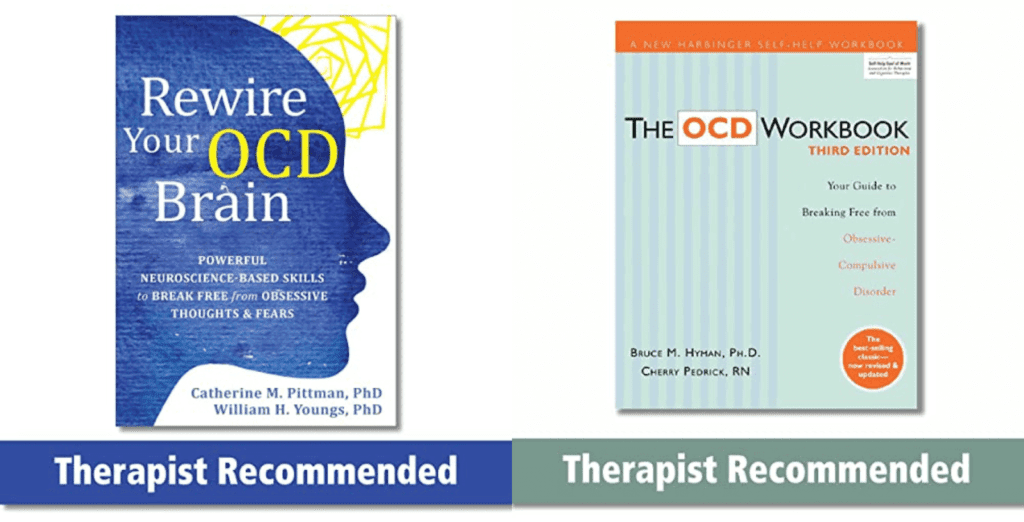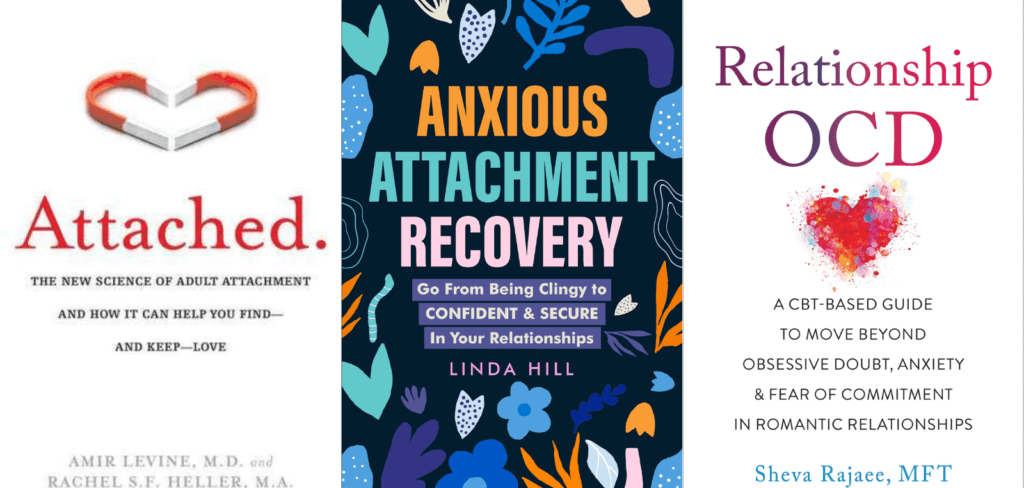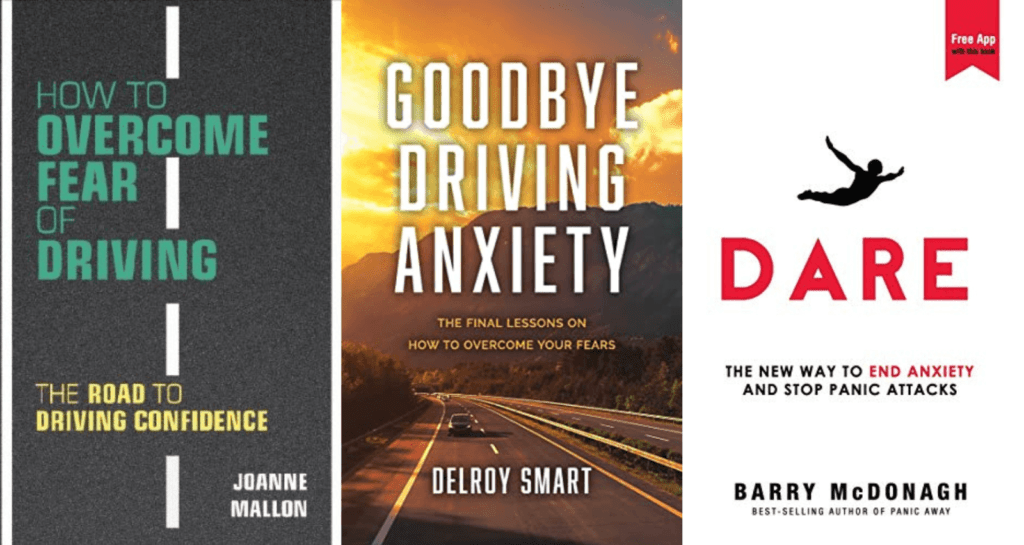The following are some of the best books on OCD intrusive thoughts to help you embark on your recovery journey.
Disclosure: Some of the links below are affiliate links. This means that, at zero cost to you, I will earn an affiliate commission if you click through the link and finalize a purchase.
Books On OCD Intrusive Thoughts
1. The Mindfulness Workbook for OCD
By Jon Hershfield MFT, Tom Corboy MFT
Combining mindfulness practices with cognitive-behavioral therapy (CBT), The Mindfulness Workbook for OCD offers practical and accessible tools for managing the unwanted thoughts and compulsive urges that are associated with OCD. With this workbook, you will develop present-moment awareness, learn to challenge your own distorted thinking, and stop treating thoughts as threats and feelings as facts.
Related: Is It ROCD Or Am I Not In Love? Top 4 Powerful Ways to Overcome Relationship Anxiety And ROCD
2. The OCD Workbook
By Bruce M. Hyman PhD LCSW, Cherlene Pedrick RN
The OCD Workbook has helped thousands of people with OCD break the bonds of troubling OCD symptoms and regain the hope of a productive life. Endorsed and used in hospitals and clinics the world over, this valuable resource is now fully revised and updated with the latest evidence-based approaches to understanding and managing OCD. It offers day-to-day coping strategies you can start using right away, along with proven-effective self-help techniques that can help you maintain your progress. The book also includes information for family members seeking to understand and support loved ones who suffer from this often baffling and frustrating disorder.
Related: How To Let Go Of OCD? Top 6 Powerful Strategies to Treat OCD Using CBT (+FREE OCD Resources)
3. The Complete OCD Workbook
By Scott Granet LCSW
The Complete OCD Workbook includes:
- An essential introduction that provides an overview of the primary treatment methods such as CBT, ERP, and mindfulness.
- Actionable exercises that use questionnaires, checklists, and reflective prompts to provide a hands-on and personalized approach to treating OCD.
- Real stories that offer support throughout your journey to healing, from patients who understand and have overcome struggles associated with OCD.
Related: How To Support A Friend With OCD? 7 Practical Ways You Can Help Someone With OCD
4. When a Family Member Has OCD
By Jon Hershfield
In When a Family Member Has OCD, you and your family will learn ways to better understand and communicate with each other when OCD becomes a major part of your household. In addition to proven-effective cognitive behavioral therapy (CBT) and mindfulness techniques, you’ll find comprehensive information on OCD and its symptoms, as well as advice for each affected family member.
Related: Resources For OCD (Information, Podcasts, APPS, TED Talks, Books)
5. Treating Your OCD with Exposure and Response (Ritual) Prevention Therapy
By Elna Yadin, Edna B. Foa, Tracey K. Lichner
Designed to be used in conjunction with its companion therapist guide titled Exposure and Ritual (Response) Prevention for Obsessive Compulsive Disorder, thisWorkbook includes an exposure and ritual prevention treatment program which is broken down into 17 – 20 biweekly treatment sessions. During these sessions the patient will be gradually exposed to situations and places that trigger his or her OCD symptoms. The goal is that over time the OCD sufferer comes to realize that the things he or she fears will not necessarily occur if the rituals are not performed. Some exposures will be supervised by the therapist, but the workbook can help the patient to practice on their own at home in order to overcome some of the barriers and difficulties that are part and parcel of every treatment.
6. Rewire Your OCD Brain
By Catherine M. Pittman PhD, William H. Youngs PhD
Written by clinical psychologist Catherine Pittman and clinical neuropsychologist William Youngs, this groundbreaking book will show how neurological functions in your brain lead to obsessions, compulsions, and anxiety. You’ll also find tons of proven-effective coping strategies to help you manage your worst symptoms—including relaxation, exercise, healthy sleep habits, cognitive restructuring, cognitive defusion, distraction, and mindfulness.
Related: Best 10 Anxiety In Relationship Books
7. The ACT Workbook for OCD
By Marisa T. Mazza PsyD
Whether you’ve just received a diagnosis, or have suffered for years, this workbook can help. Using the powerful and proven-effective treatments in this guide, you’ll learn what type of OCD you suffer from (such as harm OCD), how to identify the underlying mechanisms of your OCD, move through triggering incidents while staying present and connected to your values, be more aware and flexible, tolerate uncertainty, and commit to behaviors that ultimately allow you to lead a full, rewarding life. Once you realize what really matters to you, you’ll find the motivation needed to start on the path to psychological well-being.
Related: Journal Prompts For Anxiety (+FREE Anxiety Worksheets)
8. The Self-Compassion Workbook for OCD
By Kimberley Quinlan LMFT
The Self-Compassion Workbook for OCD outlines a step-by-step program to help you understand the emotional experience of OCD, and develop the tools you need to manage your disorder and build a better life. Drawing on a powerful combination of cognitive behavioral therapy (CBT), exposure and response prevention (ERP), and compassion-focused therapy (CFT), this breakthrough guide will teach you how to balance intense emotions, lean into your fear, and focus on recovery. Over time, you’ll learn to replace self-judgment with kindness and self-compassion, so you can stop suffering and start thriving.
Related: Top 10 Practical CBT Exercises For Generalized Anxiety Disorder Relief
9. “Pure O” OCD
By Chad LeJeune PhD
Grounded in acceptance and commitment therapy (ACT), and written by a renowned ACT and anxiety expert, “Pure O” OCD explains the process of “cognitive fusion” that leads to obsessive thinking, and how efforts to avoid or control our thoughts reinforce the fusion in an unhelpful, positive feedback loop. Using the five skills in the book—labeling, letting go, acceptance, mindfulness, and proceeding with purpose—you’ll learn how to finally break free of the struggle, worrying, and avoidance that keeps you stuck.
Related: Best 15 Stress Relief Toys For Your Wellbeing
10. Relationship OCD
By Sheva Rajaee MFT
Relationship OCD offers an evidence-based, cognitive behavioral approach to finding relief from relationship anxiety, obsessive doubt, and fear of commitment. You’ll learn to challenge the often-distorted thought patterns that trigger harmful emotions, increase your ability to think rationally, and ultimately accept the presence of intrusive thinking while maintaining the values of a healthy relationship.
How Books On OCD Intrusive Thoughts Can Help
Books on OCD intrusive thoughts can be incredibly helpful in several ways.
1. Understanding the nature of intrusive thoughts: These books provide detailed explanations about what intrusive thoughts are and how they manifest in individuals with OCD. They can help you gain a better understanding of why these thoughts occur, how they are different from regular thinking, and the role they play in OCD.
2. Normalizing the experience: Reading about other people’s experiences with intrusive thoughts can help you realize that you are not alone. It can be comforting to know that others have similar thoughts and struggles, which can reduce feelings of isolation and fear.
3. Providing coping strategies: Books on OCD intrusive thoughts often include practical exercises and strategies that can help you manage and cope with these thoughts. These techniques may include cognitive-behavioral therapy (CBT) techniques, exposure and response prevention (ERP) therapy, mindfulness exercises, and more. By following these strategies, you can learn to challenge negative thoughts and reduce their impact on your daily life.
4. Offering hope and inspiration: Many books feature personal stories of individuals who have successfully overcome their intrusive thoughts and OCD. Reading about their journey and recovery can provide you with hope and inspiration that it is possible to live a fulfilling life despite the presence of intrusive thoughts.
5. Professional guidance: Some books on OCD intrusive thoughts are written by mental health professionals who specialize in OCD treatment. These books can provide expert advice, insights, and guidance that can supplement or complement therapy sessions.
Conclusion
While books can be a valuable resource, it is essential to seek professional help if you are struggling with OCD and intrusive thoughts.
A qualified therapist can provide personalized treatment and support tailored to your specific needs.













